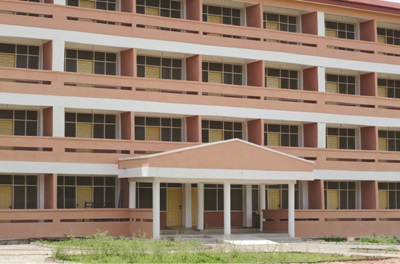Bolgatanga Technical University: A Centre of Academic and Professional Excellence Producing Skilled – Based Manpower for Contemporary Jobs

Data gathered from the Institute of Statistics, Social and Economic Research (ISSER) of the University of Ghana reveals that only 10 per cent of graduates in Ghana find jobs after their first year of completing school.
The data further points out that it may take up to 10 years for a large number of graduates in the country to secure employment. The research attributes this trend to varied challenges that range from the lack of employable skills, unavailability of funding capital for entrepreneurship, poor attitudes of graduates towards job opportunities as well as the low capacities of industry to absorb the huge numbers of graduates seeking jobs.
Perhaps it is against this background that the Government in its own wisdom converted all the 10 Polytechnics in the country into technical universities to provide technical and vocational education to produce the essential technical skills and professionals for the human resource base of the country to help contribute to sustainable national development.
One of the Technical Universities in the country that is complementing government’s efforts to realize this goal and to contribute to the reduction of the unemployment situation among young graduates in the country is the Bolgatanga Technical University (BTU).
The School which was established in 1999 but began its academic programmes in September, 2003 has a serene atmosphere for teaching and learning. It has its main campus located in Sumbrungu , near Bolgatanga, the capital of Upper East Region of Ghana.
The Mission and Vision of BTU
The University’s Mission is to provide career-focused and skill-based education, research and training with emphasis on hands-on experience and entrepreneurship development. It also by way of vision aspires to become a centre of academic and professional excellence for teaching, learning, research and community service employing state-of-the-art technology.
The Mission and Vision of BTU are anchored on efforts to addressing the spate of unemployment among the youth in the country, especially after schooling, through the provision and transfer of professional practical skills and knowledge supported by entrepreneurial skills including best and standardized teaching and learning instruction in an environment that is immersed with new technologies. Thus, making graduates of BTU relevantly unique, professional and academically fit for any job and for national development.
B.T.U Thought-provoking Programmes
Among some of the new programmes the University has introduced and currently running include Bachelor of Technology in Civil Engineering, Bachelor of Technology in Building Technology, Bachelor of Technology in Agricultural Engineering, Bachelor of Technology in Ecological Agriculture, Bachelor of Technology in Hotel Catering and Institutional Management, Bachelor of Technology in Fashion and Design , Bachelor of Accounting with Computing, Bachelor of Technology in Procurement and Supply Chain Management, Bachelor of Technology in Secretary ship and Management Studies, Bachelor of Technology in Marketing.
Others are Higher National Diploma (HND) in Banking and Finance, HND in Automobile Engineering, HND in Electrical/Electronic Engineering, HND in Medical Laboratory Technology, HND in Mechanical Engineering, HND in Statistics, HND in Hotel Catering and Institutional Management. The rest are HND in Ecological Agriculture, HND in Industrial Art, HND in Accountancy, HND in Marketing, HND in Secretary ship and Management Studies, HND in Procurement and Logistics Management , HND in Agricultural Engineering, HND in Civil Engineering and HND in Building Technology.
Among others are Diploma in Banking Technology and Accounting, Diploma in Business Administration, Diploma in Computerized Accounting. It also runs Professional Diploma programmes in Computerized Accounting and Business Administration (DBA)
It is very significant to stress that all the above programmes being run by the University are all thought–provoking courses and also essential tools for graduate employment and national development.
It must also be disclosed that apart from the BTU empowering the young graduates with employable skills, the graduates are also empowered with entrepreneurship skills making them establish their own businesses after completion of the University instead of relying on government for job creation.
Qualified and Competent Academic Staff
Another major problem that has been identified as a bane to unemployment among graduates in the country is the lack of space for them to undergo practical and industrial attachment while in school. To overcome this challenge, the management of BTU has strong collaborations with many industries in the region for students to do attachment or internship thereby making them fit professionally into the job market after completion.
Additionally, the management of the institution rely not only on recruited qualified lecturers and staff to impart knowledge and skills to the students, but also on captains from the industries who are seasoned professionals and versatile in diverse fields of studies including Engineering, Banking, Hotel, Catering and Institutional Management, Automobile and Electrical Engineering just to mention a few . These captains and the permanent lecturers of the school impart to the students, the required professional skills and technical knowledge needed for contemporary jobs.
Vibrant Administrative Staff
One does not need to be a man of God or Soothsayer to be told that the academic staff cannot discharge their duties efficiently without the support of the Administrative Staff. One of the secrets behind the achievements of the University is due to the competence and the professional manner in which the Administrative Staff discharge their duties in supporting and rallying behind the academic staff to execute their jobs diligently.
When contacted, the Vice Chancellor of the University, Professor Samuel Erasmus Alnaa, said the University has continuously built the capacity of the academic staff to provide standard contemporary hands-on training, skills and knowledge to the students for the job market.
Professor Alnaa said the 10 new programmes introduced by the University as highlighted above were all market driven programmes and that the new programmes are expected to equip the students with the requisite knowledge and skills to find solutions to societal problems.
He said while majority of the academic staff are Doctor of Philosophy (PHD) holders endowed with more technical and professional skills to impart to the students, the University was also recruiting more qualified staff to help expand and complement efforts of producing contemporary graduates suitable for nation building.
BTU Collaborators
Professor Alnaa indicated that as part of the mechanism to strengthen and build the capacity of lecturers and students, BTU is collaborating with a number of institutions including universities in India, Ouagadougou, Burkina Faso, Maryland, Eastern Shore, USA, among others to promote joint research and training among lecturers and students.
The University, the VC further noted, had out-adored a 10-year Development Planning Committee to come out with effective strategic document to fast-track the overall development of the institution.
Professor Alnaa stated that although unemployment is a global issue, the management of BTU is determined to complement government’s efforts to break that cycle to ensure that majority of graduates become self-reliant when it comes to employment.
BTU Attraction of Students
The most interesting thing is that as a result of the new programmes introduced by Bolgatanga Technical University, coupled with its academic staff strength, the school has been attracting more students across all the 16 regions of the country.
Other side attractions to students include meeting and receiving tuition from captains of industries and the school’s serene atmosphere for teaching and learning.
Some of the students of the University who came from the Greater Accra and Ashanti Regions to pursue the programmes, in an interview, indicated that they decided to attend the school because of its unique programmes.
Others also were of the opinion that unlike other universities in the big cities which campuses are bedeviled with environmental pollution such as noise and filth, that of the BTU was very conducive for teaching, learning and research. It also has qualified staff and the academic infrastructure befits its status as a Technical University.
“I decided to choose BTU instead of the Accra Technical University because I need a very unique programme to pursue that will make me fit into the job market and to also establish my own enterprise and employ others. BTU has all it takes to help me achieve my dreams. Apart from the school having very good and professional lecturers, the courses here are very unique”, Master Kofi Ankamah, a first year student of BTU studying Bachelor of Technology in Hotel Catering and Institutional Management stated.
The Upper East Regional Minister, Mr. Stephen Yakubu, observed that the Regional Coordinating Council sees BTU as one of the best training institutions in the country that provides highly marketable and professional employable skills to students. He appealed to parents across the 16 regions to send their sons and daughters to the institution to gain employable skills.
He noted that cultural diversity and integration was key to national development and said the encouragement of students across the country to attend the BTU in the Upper East Region would help promote cultural diversity and integration.
One cannot escape over the fact that one of the secrets behind the success of the University is the good leadership skills and directives provided to Management of the School by the University’s Councils.
To sum up, one can see from the above analysis that BTU is the centre of excellence in helping to inculcate in students the necessary skills needed for the job market and therefore parents need not be told that the school is the right place to send their children to.
By Samuel Adadi Akapule




